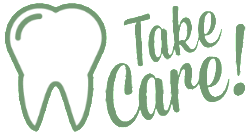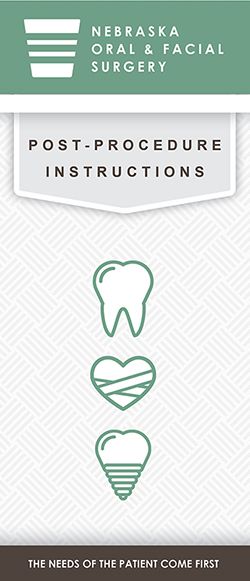Recovery Instructions
Thank you for choosing Nebraska Oral & Facial Surgery. We hope you're having a safe and smooth recovery. Please refer to the resources below to review the recovery instructions you were given while in our office. If you have any additional questions or concerns, we encourage you to call our office at 402.327.9400, where one of our Registered Nurses is happy to help. Additionally, if you are trying to contact us after office hours, please call your surgeon's cell phone. Your surgeon's cell phone number can be found on the recovery instructions brochure you were sent home with or you may download the brochure below.
Tips for a Speedy Recovery
- After your procedure, a nurse will take you to one of our state-of-the-art recovery rooms. Our rooms are equipped with high-tech monitoring to ensure your safety.
- We will inform your driver when you are in recovery and show them to your room to go over recovery instructions.
- Your nurse will stay to answer any other questions you may have before leaving our office and will send printed recovery instructions home with you for your convenience.
- When you get home, we recommend a lot of rest, icing and to begin taking your pain medication before existing numbness wears off.
- We will send you home with a recovery kit that includes extra gauze and gloves for bleeding.
- Slight to severe tingling of the lip, chin and tongue is normal and will be temporary.
- Take off work/school the day of your procedure, as well as the following day. You may want to take off more days depending on how you feel.
- After your procedure, enjoy a cup of gourmet ice cream on us!
How to Avoid Dry Sockets
-

Avoid touching the wound at all costs, other than changing gauze.
-

No smoking for at least 72 hours after tooth removal. We recommend permanent smoking cessation.
-

Do not eat foods that leave residual particles in your mouth for four days after your procedure. e.g. popcorn, peanuts, rice and pretzels
-

Eat soft foods, such as clear soup, mashed potatoes and pudding.
-

Avoid carbonated drinks.
-

Tell your doctor about any and all prescriptions you are taking before the procedure.
-

Do not drink through a straw or suck on hard candies for one week.
-

No vigorous sports or heavy lifting for 5 days.
-

No jogging or playing of musical wind instruments for 4 days.

Recover with Ease
Your procedure is over, now what? Watch as we review everything the nurses covered in your post-op recovery. This video is full of basic recovery instructions and tips to help avoid dry sockets and infection.
Specialty Instructions
Incision and Drainage | Download
- For adolescent and adult patients, we recommend taking 400-600mg Ibuprofen (Motrin, Advil) every 6 hours. You may alternate this medication with Tylenol (500-650mg) so that you are taking something for pain every 3 hours. Do not exceed 3,000 mg Tylenol daily.
- You may have been prescribed a narcotic containing pain medication (such as Norco or Oxycodone). If so, you may alternate this medication with Ibuprofen instead.
- You will want to keep a small piece of gauze lightly taped over your drain to help keep the area clean and to absorb any drainage. Change the dressing as needed.
- You are welcome to shower, but please clean around your drain carefully with a mild antibacterial soap such as Dial. Lightly pat the area dry.
- You may apply ice packs to the external area for comfort (20 minutes on, 20 minutes off).
- You may begin warm salt water soaks in the mouth. Hold the water on the affected side and work through a glass 3x/day.
Sinus Precautions | Download
Your surgeon has recommended sinus precautions for your recovery. It is recommended that you follow these precautions for 2 weeks, unless directed otherwise. The goal of sinus precautions is to prevent the passage of air and/or fluids between the mouth and sinus cavity. This will allow the sinuses to heal, preventing a permanent communication. In the case of sinus-lift bone grafts, this will prevent disruption and loss of the new graft.
Avoid
- Blowing your nose - It is best to wipe away nasal secretions carefully. After two weeks, if you must blow your nose, blow gently through both sides at the same time.
-
Blowing - Do not blow into a musical instrument or blow up balloons.
-
Sneezing - If you must sneeze, keep your mouth open and do not pinch your nose or try to hold the sneeze in.
-
Sucking - Do not drink through a straw and do not smoke.
-
Smoking - This may prevent graft healing.
-
Be cautious when - pushing, lifting, bending over
Arthrocentesis | Download
- For adolescent and adult patients, we recommend taking 600mg of ibuprofen every 6 hours for 10-14 days. If you were prescribed a narcotic you may alternate this with the ibuprofen so that you are taking something every 3 hours for the first 1-2 days.
- Keep to a soft diet for the next week.
- Ice your joint for the next 48 hours (20 minutes on, 20 minutes off), then switch to moist heat for the next several days, as needed (30 minutes daily, 3 times per day)
- Complete 5 sets of exercises as shown in recovery, 10 repetitions each, daily, until seen back for a follow-up appointment by your doctor.
- The local anesthetic may numb the eyes reflex to blink. If so, patch the eye closed until able to blink normally again. Please note, you may be unable to elevate the brow on the side of the procedure. This is temporary.
- You have a dressing on top of the injection sites that can be changed as needed. The drainage should slow down over the next few hours. You may shower normally after the dressing is removed.
Implant Post-Operative Care | Download
-
Activity: After leaving the office today, we suggest that you relax and limit your activity. You may resume normal activities, including work or school, the day after your procedure. Heavy lifting and extreme exercise should be avoided for a few days.
-
Discomfort: *See the Pain Management section of the Recovery Instructions brochure for more information. Take pain medication as prescribed. Generally, 400-600 mg Ibuprofen (Advil or Motrin) every six hours is recommended for post-operative soreness. You may also use 500-1000 mg Acetaminophen (Tylenol) every six hours.
-
Bone Grafting: In the case of a bone graft, you may notice some of the bone particulates working their way out of the socket. This may feel “gritty” in the mouth. This is normal and no cause for concern. In some cases,a membrane placed over the socket will come loose after a couple of weeks; this also is of no concern. We will remove the membrane as needed at your follow up appointment.
-
Oral Hygiene: Good oral hygiene is extremely important following implant placement. You may resume brushing and flossing the evening of your procedure. Be careful to avoid brushing the surgical sites for two weeks. Use the Peridex oral rinse twice daily to keep the implant site clean and healthy. After two weeks, you may resume brushing the implant as you would your normal teeth. Avoid smoking.
-
Diet: You should resume eating and drinking right away. Follow a soft diet to start, but advance as tolerated. Be careful to avoid biting or chewing directly on the implant for the first two months. This is extremely important especially if there is a healing cap peeking out of the tissue. Pressure on the implant during the first few months after surgery is the number one cause of implant failure.
Full Mouth Extraction with Immediate Denture | Download
-
It is important to take your medication as prescribed to control discomfort. Good oral hygiene is very important. The morning after your procedure, begin using Peridex oral rinse two times daily and
salt-water rinses four times daily. -
Your stitches/sutures are resorbable. They will loosen and fall out within the next week or two.
-
See your dentist the day after your procedure or as soon as possible within the first few days.
-
Do not remove your dentures for the first 24 hours after surgery, even at night (or for 48 hours if you did not have an appointment with your dentist the day after). *An exception to this would be if the dentures simply will not stay in place at all. The dentures serve to compress the tissues to stop bleeding and minimize swelling. After that, you can remove the dentures at night to ensure healthy blood flow to the tissues.
-
You can clean your denture with denture cleaner or follow the advice of your dentist or prosthodontist.
-
Be patient with yourself as you acclimate to eating and speaking with your new dentures. It is normal to have excess saliva initially.
-
As you heal, your tissues will change and your dentures may require adjustment by your dentist.
We're Here To Help
Whether you have questions about removing your wisdom teeth, placing dental implants, or any other procedure, we're here to help.
Give us a call at 402.327.9400 where our specialists are happy to help you.

